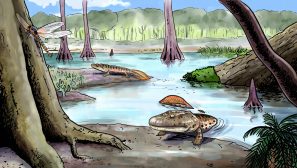Definition
noun
A theory stating that evolutionary change happens slowly, steadily and gradually in an attempt of the species to continue to adapt to new challenges over the course of their history until they became (gradually) new species different from their ancestors.
Supplement
Foraminiferans, a tiny species of marine animals living in Indian ocean, are said to demonstrate this process of evolution. The species remained relatively unchanged from about 10million to 6 million years ago then began a slow modification lasting about 600 000 years till they became an entirely new and different species from their ancestors.
Dictionary > Phyletic gradualism
You will also like...

Circulation
The circulatory system is key to the transport of vital biomolecules and nutrients throughout the body. Learn about the ..

Freshwater Ecology
Freshwater ecology focuses on the relations of aquatic organisms to their freshwater habitats. There are two forms of co..

Amphibians & Early Reptiles
Obtaining air outside an aquatic environment required species to acquire suitable adaptations, and this was the case of ..

Kidneys and Regulation of Water and Inorganic Ions
The kidneys are responsible for the regulation of water and inorganic ions. Read this tutorial to learn about the differ..

Ecology & Biodiversity: New Zealand Flora & Fauna
New Zealand is known for its unique biodiversity, caused by its remarkable geography and geologic history. Breaking away..

Fruits, Flowers, and Seeds
This tutorial deals with the structure and function of flowers, fruits, and seeds. Also included here are the types of f..

